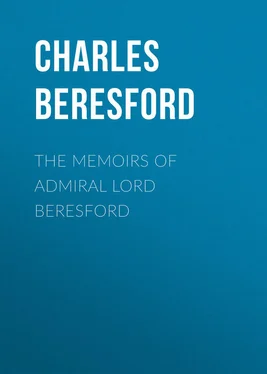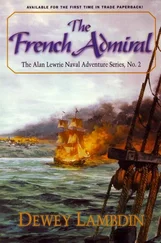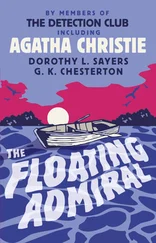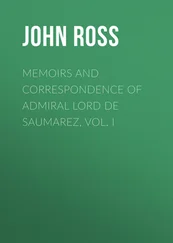Charles Beresford - The Memoirs of Admiral Lord Beresford
Здесь есть возможность читать онлайн «Charles Beresford - The Memoirs of Admiral Lord Beresford» — ознакомительный отрывок электронной книги совершенно бесплатно, а после прочтения отрывка купить полную версию. В некоторых случаях можно слушать аудио, скачать через торрент в формате fb2 и присутствует краткое содержание. Жанр: foreign_antique, foreign_prose, на английском языке. Описание произведения, (предисловие) а так же отзывы посетителей доступны на портале библиотеки ЛибКат.
- Название:The Memoirs of Admiral Lord Beresford
- Автор:
- Жанр:
- Год:неизвестен
- ISBN:нет данных
- Рейтинг книги:5 / 5. Голосов: 1
-
Избранное:Добавить в избранное
- Отзывы:
-
Ваша оценка:
- 100
- 1
- 2
- 3
- 4
- 5
The Memoirs of Admiral Lord Beresford: краткое содержание, описание и аннотация
Предлагаем к чтению аннотацию, описание, краткое содержание или предисловие (зависит от того, что написал сам автор книги «The Memoirs of Admiral Lord Beresford»). Если вы не нашли необходимую информацию о книге — напишите в комментариях, мы постараемся отыскать её.
The Memoirs of Admiral Lord Beresford — читать онлайн ознакомительный отрывок
Ниже представлен текст книги, разбитый по страницам. Система сохранения места последней прочитанной страницы, позволяет с удобством читать онлайн бесплатно книгу «The Memoirs of Admiral Lord Beresford», без необходимости каждый раз заново искать на чём Вы остановились. Поставьте закладку, и сможете в любой момент перейти на страницу, на которой закончили чтение.
Интервал:
Закладка:
"Well, Jones. Good evening, Jones. I suppose, now, you've heard of my uncle, the admiral?"
"Heard of 'im, sir? I should think I 'ad heard of 'im. Ah, he was a man , he was. He could handle a ship, he could – ah, and handle the men, too!"
"Why, where did you serve with him, Jones?"
"Where, sir? Where not? All over the world, sir. Ah, he was a man!"
"I'm delighted to meet anyone who knew a member of my family so well, Jones – delighted, I assure you."
"Knew 'im? Why, sir, to know 'im was to admire 'im, as the saying is. Many a time I've seen the men turn out for to admire 'im, sir.
"Have you indeed, Jones – have you indeed! Dear me. Most interesting, I am sure. I daresay a glass of grog would not come amiss to you, Jones?"
"Wery kind of you, I'm sure, sir. It 'ud be a pleasure to drink your health, and the admiral's too, sir. Ah, he was a man!"
Mr Jones, afterwards, forward on the lower deck, to envious friends:
"Pretty sweet conversation that, mates. I wonder 'oo the b – y h – l 'is uncle might 'a been!"
There was another member of the suite who surely deserves record – the elephant. He was really a member of the ship's company, for he could do, and did, the work of twenty men. He joined the ship in India, when he was quite small, and he grew enormously on board. He lived in a house built aft, and fed upon branches of trees and bran and biscuits and anything he could get. I trained him myself. I taught him to obey the words of command, and he would do anything for me. He would hoist me upon his shoulders with a fore foot, or upon his back with a hind foot. In the dinner hour, when most of the men were below, he used to take his share in working the ship. We slung the rope in a bowline round his neck, and he would clew up the mainsail by walking on till he was told to stop. He was never seasick. He used to balance himself, swaying to and fro as the ship rolled. One night when the midshipmen and I, having supper on deck aft, were called forward to trim sails, the elephant finished the meal for us. He ate everything on the table, put his foot on the plates and smashed them, and squashed the big coffee-tin quite flat. Then he looked at us like a naughty child.
I was the only person who could persuade him to leave the ship or to come on board again when he had been ashore. When we reached home, he was put in a railway truck and directed to the Zoological Gardens. His keeper, a marine artilleryman, went with him in the truck. Elephants have a habit of rolling on their feet and squirming their vast bulk. When the marine was trying to pass the elephant, the great beast unconsciously pinned his keeper against the side of the truck, and against a projecting bolt, which broke the man's rib, forcing it into his heart. He was taken out dead.
CHAPTER XIII
FLAG-LIEUTENANT AT PLYMOUTH
In 1871, I was appointed flag-lieutenant to Admiral (afterwards Admiral of the Fleet) the Hon. Sir Henry Keppel, commander-in-chief at Plymouth. His flag was flown in the Royal Adelaide . Sir Harry, as already recorded, had been commander-in-chief upon the China station when the Duke of Edinburgh visited Japan, and had accompanied his Royal Highness upon his visit to the Mikado. It was at Plymouth that I first had the honour of serving under Sir Harry Keppel: a splendid seaman, a most distinguished officer, a fine sportsman, one of the best and kindest of men.
Admiral the Hon. Victor Montagu, who served as a midshipman under Sir Harry, relates in his Reminiscences some interesting actions of his old captain, which I may be permitted to quote. Commodore Keppel distinguished himself by his personal gallantry and skilful leadership in the battle of Fatshan Creek, 1st June, 1857; of which a full account is given in Laird Clowes' The Royal Navy ; and Admiral Montagu records his own recollections of the affair:
"During the many years in which I knew him I never once Sir Harry lose his temper, except when the Chinese war-junks beat us back on the first attack we had made on them… John Chinaman, seeing us retire, took the hint, and began making off himself, which so infuriated Harry Keppel that he jumped up on our paddle-box, shook his fist at the war-junks, some 500 or 600 yards away, and shouted out: 'You d – d rascals! I'll pay you out for this! Man the boats, boys – man the boats at once! The beggars are trying to escape!' I never saw such a rush. At no regatta could men have rowed faster."
Commodore Keppel commissioned the Raleigh frigate, 50 guns, for the China station. Admiral Montagu states that she was "the last man-of-war that ever sailed out of Portsmouth Harbour." Keppel would have none of your steam-tugs. "We ran out with a fair wind with studding-sails set on both sides." Alas! the Raleigh never came back any more. On 14th April, 1857, she struck a sunken rock in the China Seas, near Macao. Keppel's indomitable conduct turned a disaster into an achievement.
"Shortly afterwards," writes Admiral Montagu, who was a midshipman on board at the time, "we descried a French squadron lying at anchor in Macao Roads, with an admiral's flag flying, and, though we were firing minute guns of distress as the water gained on our pumps, Keppel, nothing daunted, called out: 'Up with the French flag. Give him his salute. Sinking or not, let the Frenchmen hear us.'"
A French frigate coming to the assistance of the Raleigh , her captain asked permission "to go below to see how high the water had risen in the ship. 'Oh,' said Keppel, 'don't go below; look down the hatchway.' 'Ah! mon Dieu!' exclaimed the captain." …
Keppel kept the pumps going, crowded sail on the ship, and finally beached her off Macao, just in time. He landed the ship's company, but himself stayed aboard the vessel, sleeping on the bridge. The stores and guns were saved. Keppel was deeply distressed at the loss of his fine ship, "which," he wrote, "brings my career as a captain to an end." Fortunately he was mistaken. In after years, when I told him that the Admiralty were about to build a second Raleigh , Keppel replied, "Very glad to hear it, my dear boy. I had the honour of losing the first one."
Admiral Montagu records that Keppel, while in command of the Raleigh , challenged an American clipper ship to race from Penang to Singapore. "We were constantly going at a speed of thirteen knots, during heavy squalls, close-hauled, and trailing the muzzles of our main-deck guns through the water on the lee side, and I sometimes used to turn into my hammock in abject terror, fearing that at any moment we might capsize."
Sir Harry Keppel was famous throughout the Service when I was appointed his flag-lieutenant. One of my first recollections of that office concerned an old-fashioned "Eighteen-hundred-and-war-time," peppery, strict-service captain, who, having just come home from the West Coast of Africa, asked to see the commander-in-chief. It happened that Sir Harry and myself were on the point of going out hunting when the old captain called, and the admiral was attired in hunting kit.
"Tell him I'll see him to-morrow," said Sir Harry.
But that wouldn't do at all, nor would any other excuse serve.
"I insist on seeing the admiral," said the captain. "I have just come home and it is my duty to see him at once."
"Bring him in, then," said Sir Harry impatiently, "Now, sir," said he, "my flag-lieutenant informed you that I was engaged. Why couldn't you see the secretary?"
"The secretary, sir? The secretary!" says the old captain wrathfully staring at Sir Harry's informal attire. "Indeed I am told, sir, that the secretary is the Commander-in-chief here. That's what they say, sir – that's what they say!"
"Do they?" returned Sir Harry placidly. "And a d – d good commander-in-chief too!" says he.
Читать дальшеИнтервал:
Закладка:
Похожие книги на «The Memoirs of Admiral Lord Beresford»
Представляем Вашему вниманию похожие книги на «The Memoirs of Admiral Lord Beresford» списком для выбора. Мы отобрали схожую по названию и смыслу литературу в надежде предоставить читателям больше вариантов отыскать новые, интересные, ещё непрочитанные произведения.
Обсуждение, отзывы о книге «The Memoirs of Admiral Lord Beresford» и просто собственные мнения читателей. Оставьте ваши комментарии, напишите, что Вы думаете о произведении, его смысле или главных героях. Укажите что конкретно понравилось, а что нет, и почему Вы так считаете.












